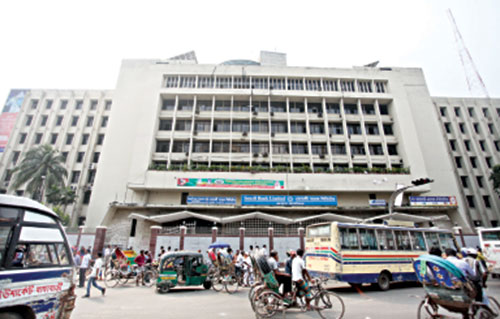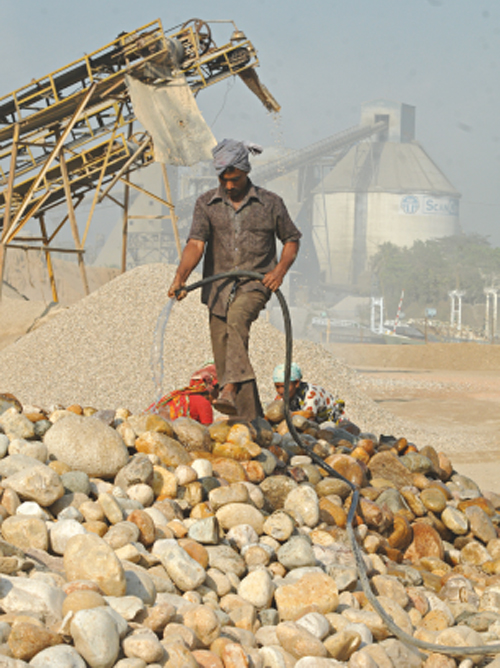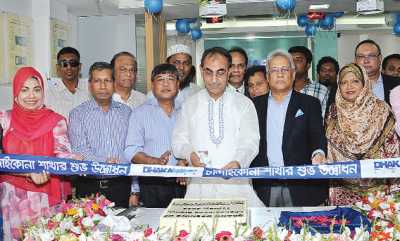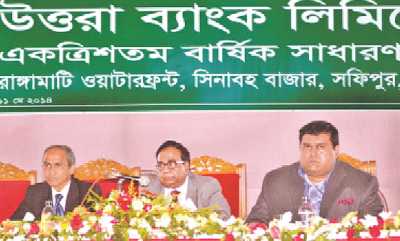Banking
Banks, defaulters misuse relaxed rescheduling policy as BB goes soft
 Defaulted loans in the banking sector increased by Tk 7,589.15 crore in the first three months of this year as many of the loan defaulters, who were allowed to reschedule their loans on the ground of pre-poll political unrest became defaulters again.
Defaulted loans in the banking sector increased by Tk 7,589.15 crore in the first three months of this year as many of the loan defaulters, who were allowed to reschedule their loans on the ground of pre-poll political unrest became defaulters again.
According to the Bangladesh Bank data released on Monday, defaulted loans rose to Tk 48,172.16 crore as of March 31, 2014 from Tk 40,583.01 crore as of December 31, 2013.
Classified loans in the banking sector were Tk 56,720.10 crore as of September 30, 2013.
BB officials and experts said most of the scheduled banks had misused the central bank’s relaxed loan rescheduling policy that resulted in the surge in defaulted loans in the first quarter of 2014.
Classified loans reached 10.45 per cent of the total outstanding loans of Tk 4,60,758.63 crore in the banking sector as of March 31, 2014.
As on December 31, 2013, it was 8.93 per cent of the total outstanding loans of Tk 4,54,435.26 crore.
The BB on December 23 last year relaxed rescheduling policy for six months for all kinds of loans of the businesses who had suffered losses due to the political unrest.
Under the relaxed policy, the scheduled banks between December 23, 2013 and March 20, 2014 regularised loans worth Tk 14,765 crore taken by the unrest-hit businesses.
BB deputy governor SK Sur Chowdhury told New Age that a number of businessmen had failed to pay instalments against their rescheduled loans to the banks concerned that increased the defaulted loans in recent months.
‘Some of them [businesspeople] did not pay the down payments in line with the conditions of rescheduling,’ he said.
Classified loans in the banking sector also rose as the BB recently identified a huge amount of defaulted loans in different banks, Sur said.
Former BB deputy governor Khondker Ibrahim Khaled told New Age that the central bank’s relaxed rescheduling policy had not put any positive impact on the banking sector as the majority of the banks had misused the policy.
‘We criticised the policy when the BB had taken the initiative. The banks rescheduled the defaulted loans on the basis of their relationship with the clients irrespective of the loans’ merit. The BB should not have taken the relaxed policy,’ he said.
Directors of the scheduled banks gained huge profit by rescheduling the defaulted loans as the banks were not required to keep provision against the rescheduled loans, he said.
Of the total classified loans, those of the four state-owned banks rose by Tk 2,082.68 crore in the first quarter of 2014.
Classified loans in the SCBs increased to Tk 18,688.93 crore as of March 31, 2014 from Tk 16,606.25 crore as of December 31, 2013.
Classified loans in the private commercial banks rose by Tk 4,212.96 crore in the period.
The total classified loans in the PCBs increased to Tk 18,528.62 crore as of March 31, 2014 from Tk 14,315.66 crore as of December 31, 2013.
Classified loans in the four specialised development banks rose by Tk 1,369.76 crore in the first three months of 2014.
The total classified loans in the banks soared to Tk 9,727.32 crore as of March 31, 2014 from Tk 8,357.56 crore as of December 31, 2013.
Classified loans in the nine foreign commercial banks, however, decreased by Tk 76.27 crore in the first quarter of 2014.
The total classified loans in the banks declined to Tk 1,227.28 crore as of March 31, 2014 from Tk 1,303.55 crore as of December 31, 2013.
The BB data showed that a number of banks registered significant amount of defaulted loans in the first quarter of this year.
The classified loans in BASIC Bank increased to Tk 2,557.34 crore as of March 31, 2014 from Tk 1,282.57 crore as of December 31, 2013, those of Sonali Bank to Tk 10,432.43 crore from Tk 9,629.23 crore, those of Janata Bank to Tk 3,343.48 crore from Tk 2,605.26 crore, those of Rupali Bank to Tk 1,588.56 crore from Tk 1,053.91 crore and those of Islami Bank Bangladesh to Tk 2,065.99 crore from Tk 1,364 crore.
Sonali Bank suffers Tk 895cr capital shortfall again

A file photo shows the headquarters of Sonali Bank at Motijheel in Dhaka. Bangladesh Bank on Sunday asked Sonali Bank to raise fund maintaining its minimum capital requirement as the bank suffered a capital deficit of Tk 895 crore as of December 31, 2013
Bangladesh Bank on Sunday asked Sonali Bank to raise fund maintaining its minimum capital requirement as the bank suffered a capital deficit of Tk 895 crore as of December 31, 2013.
The BB also asked the four state-owned banks — Sonali, Janata, Agrani and Rupali — to speed up their monitoring on the loans which had recently been rescheduled from the defaulted position considering the political unrest.
The central bank came up with the directives at a meeting, presided over by BB deputy governor Abu Hena Mohd Razee Hassan, at its headquarters in the capital.
The meeting was held with the SCBs under the memorandum of understanding between the central bank and the SCBs.
The managing directors of the SCBs and senior officials of the BB attended the meeting.
A BB official told New Age on Sunday that it was a frustrating situation for Sonali Bank that it had plunged again in a capital shortfall despite a recent recapitalisation of Tk 1,995 crore made by the government.
‘Sonali Bank earlier showed that it had a capital surplus of Tk 249 crore as of December 31, 2013. But, the bank’s audited report showed that the bank suffered a capital shortfall of Tk 895 crore as of December 31, 2013’, he said.
The BB data showed that the minimum capital requirement of the bank stood at Tk 3,723 crore as of December 31, 2013 while it could maintain Tk 2,828 crore.
Under the circumstances, the capital adequacy ratio of the bank stood at 7.59 per cent against the required 10 per cent in line with the BASEL-II recommendations.
Against the backdrop, the BB asked the bank to raise its required capital in the quickest possible time by earning profit.
The other three state-owned banks, however, were able to maintain their required capital in the period.
The BB in the meeting criticised Sonali Bank and Agrani Bank as they failed to achieve the recovery of the classified loan from the top 20 defaulters, the BB official said.
Janata and Rupali were the higher achievers, reaching 117 per cent and 217 per cent of their targets respectively for retrieving defaulted loans from the top 20 defaulters.
In comparison, Sonali and Agrani performed poorly, managing 37 per cent and 42 per cent of their targets respectively.
The central bank set a new recovery target of classified loan from the top 20 defaulters in 2014.
The BB asked Sonali Bank to recover Tk 315 crore from the top 20 defaulters, while the target was Tk 120 crore for Janata Bank, Tk 150 crore for Agrani Bank and Tk 38 crore for Rupali Bank.
The BB asked the SCBs to gear up their monitoring on the rescheduled loans considering the recent political unrest so that the loans would not be defaulted further, the BB official said.
The central bank gave directives to the SCBs to follow their respective credit growth set by the central bank, he said.
The BB will take punitive measures against the banks if they fail to comply with the BB directives, he said.
The BB asked the SCBs to maintain the Internal Control Compliance guideline so that the banks could avoid the financial crime and forgery.
ADB sticks to lower GDP growth projection of 5.6pc
 A file photo shows a labourer soaking stones to make smashing easier at a construction site in the city. The Asian Development Bank on Monday reiterated that the country’s GDP growth rate would be 5.6 per cent.
A file photo shows a labourer soaking stones to make smashing easier at a construction site in the city. The Asian Development Bank on Monday reiterated that the country’s GDP growth rate would be 5.6 per cent.
The Asian Development Bank on Monday reiterated the country’s GDP growth rate at 5.6 per cent because of political unrest surrounding the January 5 election which resulted in declining remittances and export orders in 2013-14 fiscal year.
In its quarterly update released on the day, the Manila-based multilateral donor also said that industrial growth would be lower to 8 per cent and service sector growth would lower to 5.4 per cent because of the political unrest.
The ADB said inflation was on the rise, revenue collection was lagging the target and private sector credit flows slowed due to weak business environment.
Domestic demand was depressed in the first half of the year, as the prolonged political unrest ahead of the January elections lowered consumers’ and investors’ confidence, it said.
‘This is reflected in lower private credit growth, declining imports of consumer goods and capital machinery, and modest growth in the import of raw materials,’ it said in the report.
It, however, said growth was expected to rebound to 6.2 per cent in FY15 as growth prospects in the United States improve and the eurozone posts a mild recovery.
Investment has remained virtually stagnant at around 25 per cent to 26 per cent of the GDP which needs to be raised to 32-33 per cent, it said.
The ADB said production by the readymade garment industry may also be affected if foreign buyers postpone orders complaining about delays in implementing agreed fire and building safety standards to prevent recurrence of industrial accidents.
‘Growing power and gas shortages could constrain industrial production; production costs could rise from the expected rise in power and fuel prices, and higher wages in the garment industry,’ it said.
Service sector growth, which accounts for the principal share of Bangladesh’s output and employment, would slip to 5.4 per cent in FY14 due to the loss of output in the pre-election unrest and slower industrial growth, said the ADB.
‘Lower credit growth for trade; sluggish demand in retail and wholesale trade, hotels and restaurants, transport, and tourism; and the fall in commercial banks’ operating profits are evidence of slower service sector growth,’ it said.
The ADB said agriculture growth was expected to rise to 3.0 per cent in FY14 because of the favorable weather conditions and the previous year’s low base.
‘Disruptions to the distribution network during the pre-election political unrest affected marketing of agricultural products,’ it said.
Earlier in April, the World Bank projected the country’s GDP growth would hit 11-year low to 5.4 per cent in the current fiscal year because of fallout from the political unrest in the first half of the year.
Dhaka Bank opens branch in Sirajganj
 Mirza Abbas Uddin Ahmed, Founder and Director of Dhaka Bank Limited, inaugurates the 74th branch of the bank at Chandaikona in Sirajganj on Sunday.
Mirza Abbas Uddin Ahmed, Founder and Director of Dhaka Bank Limited, inaugurates the 74th branch of the bank at Chandaikona in Sirajganj on Sunday.
Dhaka Bank Limited opened its 74th branch at Chandaikona in Sirajganj on Sunday.
Mirza Abbas Uddin Ahmed, Founder and Director of the bank inaugurated the branch as chief guest, said a press release.
Abdul Hai Sarker, Chairman of Dhaka Bank Limited, Afroza Abbas, Rokshana Zaman, Reshadur Rahman, Altaf Hossain
Sarker and Abdullah Al Ahsan, Directors and ATM Hayatuzzaman Khan, Sponsor Director and former chairman of the bank were also present.
Niaz Habib, Managing Director and Emranul Huq, Deputy Managing Director of the bank were also present.
Uttara Bank approves 10pc stock, 15pc cash dividends

Azharul Islam, Chairman of the board of directors of the bank presided over the meeting.
Iftekharul Islam, Vice Chairman, Shaikh Abdul Aziz, Managing Director, and directors of the bank attended the meeting.
During the meeting, the board approved the Annual Report-2013 including the profit and loss account.



